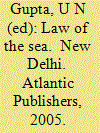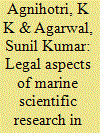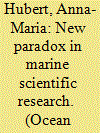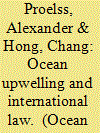| Srl | Item |
| 1 |
ID:
059373


|
|
|
|
|
| Publication |
New Delhi, Atlantic Publishers, 2005.
|
| Description |
v 1&2 (1-285p., 286-587p.)
|
| Standard Number |
8126904321
|
|
|
|
|
|
|
|
|
|
|
|
Copies: C:2/I:0,R:0,Q:0
Circulation
| Accession# | Call# | Current Location | Status | Policy | Location |
| 049234 | 341.45/GUP 049234 | Main | On Shelf | General | |
| 049235 | 341.45/GUP 049235 | Main | On Shelf | General | |
|
|
|
|
| 2 |
ID:
097588


|
|
|
|
|
| Publication |
2010.
|
| Summary/Abstract |
The recent incident involving a United States ship (USS) Impeccable in the South China Sea has led to considerable debate over the jurisdiction of a coastal state to regulate marine scientific research (MSR) in its exclusive economic zone. This article examines the legal framework for MSR as embodied in the United Nations Convention on the Law of the Sea and interprets its provisions as applicable in the Impeccable 'incident' on the basis of the Vienna Convention on the Law of Treaties. This incident may set a wrong precedent for interpreting other international treaties on similar lines, the implications of which will be detrimental to international cooperation, as it can escalate tensions among the concerned countries. Hence, the matter may be taken up as an agenda item in the next Meeting of State Parties of UNCLOS (generally held in May-June every year) to clarify aspects related to maritime research and build a consensus on the issue.
|
|
|
|
|
|
|
|
|
|
|
|
|
|
|
|
| 3 |
ID:
108591


|
|
|
|
|
| Publication |
2011.
|
| Summary/Abstract |
Concerns about the negative effects of marine scientific research are in clear juxtaposition to the beneficial role that scientific knowledge plays in enhancing the understanding of the oceans and protecting the marine environment. This presents a regulatory paradox that is examined in this article in light of the legal framework in the 1982 United Nations Convention on the Law of the Sea. The article traces how these general principles in the Convention are elaborated in soft law instruments for the promotion of environmentally sustainable research practices. It also looks at an example of state practice in this area by examining regulatory measures instituted in the Canadian Endeavour Hydrothermal Vent Marine Protected Area.
|
|
|
|
|
|
|
|
|
|
|
|
|
|
|
|
| 4 |
ID:
116125


|
|
|
|
|
| Publication |
2012.
|
| Summary/Abstract |
Ocean upwelling pipes are used to upwell nutrient-rich deeper waters in order to fertilize the surface ocean. This article addresses whether international legal rules exist governing the deployment of ocean pipes and which states are entitled to exercise jurisdiction over these objects. Taking into account the need to avoid user conflicts and unauthorized deployment of upwelling pipes in marine areas under the jurisdiction of third states, the article advocates the development of nonbinding guidelines that would implement the general terms of the United Nations Convention on the Law of the Sea.
|
|
|
|
|
|
|
|
|
|
|
|
|
|
|
|
| 5 |
ID:
140738


|
|
|
|
|
| Summary/Abstract |
In contrast to traditional ocean observation systems such as research vessels and moorings, gliders, a specific category of autonomous underwater vehicles, can be operated individually or as fleets. These devices are designed to allow for continuously and remotely commanded ocean observation from the surface down to at least 1 km depth and deliver data with high horizontal and temporal resolution. This article assesses the legal framework and identifies the legal conditions that ought to be fulfilled in order to deploy and operate gliders in conformity with the international law of the sea.
|
|
|
|
|
|
|
|
|
|
|
|
|
|
|
|